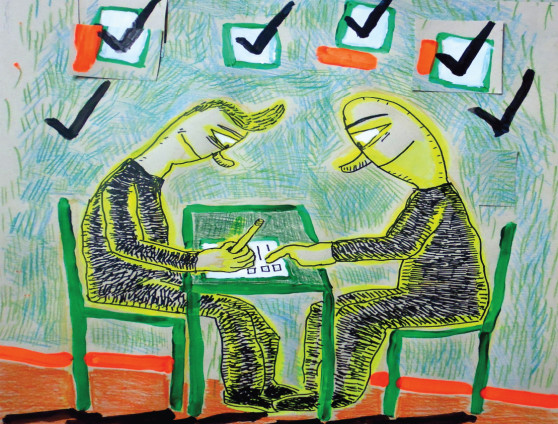Everything you need to know about the National Student Survey
Gepubliceerd: 18 January 2016 • Leestijd: 2 minuten en 46 seconden • English Dit artikel is meer dan een jaar oud.Are you satisfied with your study programme, your lecturers, your schedules? This week, over seven hundred thousand students will receive an invitation to participate in the National Student Survey.

Go on, fill it out, say the organisers. Even if just to try your luck. Five participants will win tuition fees for six months (almost one thousand Euros) and another 205 students will receive a gift voucher worth 25 Euros.
But what exactly is the National Student Survey? We answer a few questions.
What is the survey about?
Your study programme. It covers various aspects, from the expertise of lecturers to the availability of workstations in the library, anything study-related. Students can indicate whether they are very satisfied, very unsatisfied, or something in-between.
What is the purpose of the survey?
To ascertain how satisfied students are. Or how unsatisfied. You can use the survey results to compare study programmes.
Who would want to compare study programmes?
Students, of course, or their parents. Once they have opted for Law, Economics or primary school teacher training, they still need to select a university or university of applied sciences. Thanks to the NSE (National Student Survey), they will know where students are satisfied and where they are not.
The results can also be used to inform the development of study programmes. For example, if students are complaining about lecture schedules, then something may need to change. If they do not find the subject matter interesting, then clearly there is an issue with the study programme.
Where will the results be published?
They will be entered into a large database. The results will appear on Studiekeuze123.nl, where prospective students can compare study programmes online. Keuzegids and Elsevier weekly magazine also report on the results. In addition, study programme information leaflets must state how (un)satisfied students are.
Will my lecturers see my responses to the survey?
No, that should not happen.
Could it count against me if I am critical?
You remain anonymous, because responses are not attributed to individual students. In that sense, it does not matter.
If your study programme suddenly appears to be very poor, that could have a negative effect on the value of your diploma. However, the study programme would have to be very poor indeed. In general, a Dutch higher education diploma is well regarded and employers are not concerned where you obtained it.
Is the survey objective?
Well, does it matter whether a student is ‘satisfied’ about their lecturers rather than ‘very satisfied’? The scores are not entirely straightforward, they have to be interpreted. However, overall, the responses provide a great deal of information.
What is perhaps more interesting is which questions students are asked and which they are not. Student organisations ISO (the Dutch National Students’ Association) and LSVb (the Dutch Student Union) have to negotiate those with universities, universities of applied science, and private educational institutions. Thus, there is a degree of politics involved. Previously, market researchers asked how many hours per week students devoted to their studies in order to easily identify the least demanding study programmes. That question has been removed. However, you may still indicate how satisfied you are with the study load.
Are they more critical in the Randstad than in the provinces?
No, they are not. Years ago, the survey was managed by the editors of the Keuzegids. They requested a score for the IB group, now the Education Executive Agency of the Dutch Ministry of Education, Culture and Science. It turned out that students in the provinces were no more critical than those in the Randstad. Therefore, differences in scores cannot be attributed to that factor.
I have lost the invitation…
No problem, you can still participate. Go to www.nse.nl and give your email address. You will then be sent a new invitation.
… I don’t have time right now…
Students still have until 6 March to complete it.
… and I am a part-time student…
You may still participate.
… and I have just graduated or quit!
You may still participate if you received an invitation. After all, you have only just finished and are still very familiar with the study programme.
I would like to know more.
Then please see the National Student Survey’s own FAQ
HOP, Bas Belleman






Laat een reactie achter
Spelregels
De redactie waardeert het als je onder je eigen naam reageert.
Lees hier alle details over onze spelregels.
Aanbevolen door de redactie
Docenten starten petitie: HR moet zich uitspreken tegen schending mensenrechten in Gaza
Vervroegde renovatie Museumpark gaat zorgen voor ingrijpend verhuiscircus
Ondernemende Ad-student Joyce start op HR pilot met gratis menstruatieproducten
Back to Top